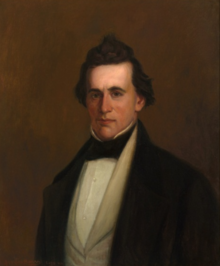John White | |
|---|---|
 1911 portrait | |
| 15th Speaker of the United States House of Representatives | |
| In office May 31, 1841 – March 4, 1843 | |
| Preceded by | Robert M. T. Hunter |
| Succeeded by | John W. Jones |
| Member of the U.S. House of Representatives from Kentucky | |
| In office March 4, 1835 – March 3, 1845 | |
| Preceded by | James Love (9th) Willis Green (6th) |
| Succeeded by | Richard French (9th) John Preston Martin (6th) |
| Constituency | 9th district (1835–1843) 6th district (1843–1845) |
| Member of the Kentucky House of Representatives | |
| In office 1832 | |
| Personal details | |
| Born | John D. White February 14, 1802 Cumberland Gap (now Middlesboro, Kentucky), U.S. |
| Died | September 22, 1845 (aged 43) Richmond, Kentucky, U.S. |
| Resting place | Frankfort Cemetery |
| Political party | Whig |
| Profession | Lawyer |
John D. White (February 14, 1802 – September 22, 1845) was an American lawyer and politician who was the 15th speaker of the United States House of Representatives from 1841 to 1843. A member of the Whig Party, he represented Kentucky in the United States House of Representatives from 1835 to 1845. He was also a member of the Kentucky House of Representatives in 1832.
Born near Middlesboro, Kentucky, a small rural mountain town located in the Eastern Kentucky Coalfield, John was a member of the prestigious White family of politicians of Kentucky and Tennessee. He received a common education and studied law at Greeneville College in Tusculum, Tennessee. After graduating, White was an apprentice under William Owsley, another successful politician and lawyer. White was then admitted to the bar and quickly built a reputation as an adept lawyer.
Within several years, White was leading the Kentucky bar. Using his powerful and convincing speaking skills, he progressed to become one of the local leaders of the Whig Party and won election to the Kentucky House of Representatives. In 1835, he won election to the U.S. House of Representatives, representing Kentucky's 9th congressional district, and was continuously re-elected until his retirement in 1845. With the help of Henry Clay, he was chosen as speaker of the house, one of the highest political positions in the United States. He served as speaker for one term, but due to ineffective governing by his colleagues, he lost re-election as speaker. He served another term as a member of the House before he was appointed judge of the 19th judicial district in Kentucky. During the last few months of his life, he suffered from ill mental health, which eventually led to his death by suicide in September 1845.